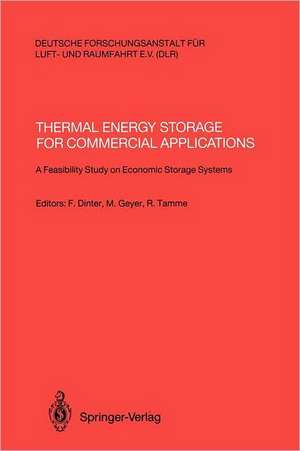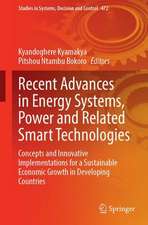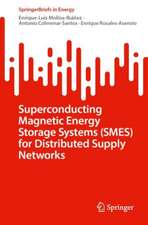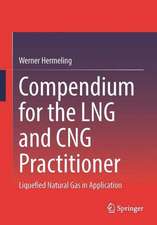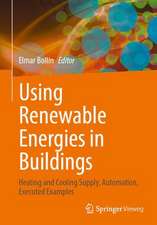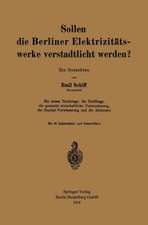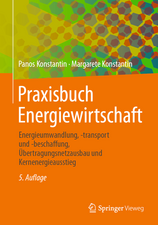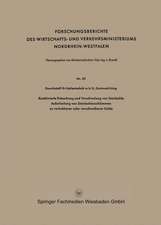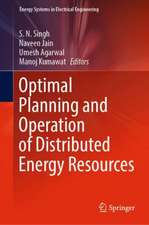Thermal Energy Storage for Commercial Applications: A Feasibility Study on Economic Storage Systems
Editat de Frank Dinter, Michael A. Geyer, Rainer Tammeen Limba Engleză Paperback – 11 iul 1991
Preț: 645.47 lei
Preț vechi: 759.37 lei
-15% Nou
Puncte Express: 968
Preț estimativ în valută:
123.55€ • 134.25$ • 103.85£
123.55€ • 134.25$ • 103.85£
Carte tipărită la comandă
Livrare economică 21 aprilie-05 mai
Preluare comenzi: 021 569.72.76
Specificații
ISBN-13: 9783540530541
ISBN-10: 3540530541
Pagini: 420
Ilustrații: XI, 401 p.
Dimensiuni: 152 x 229 x 22 mm
Greutate: 0.56 kg
Ediția:Softcover reprint of the original 1st ed. 1991
Editura: Springer Berlin, Heidelberg
Colecția Springer
Locul publicării:Berlin, Heidelberg, Germany
ISBN-10: 3540530541
Pagini: 420
Ilustrații: XI, 401 p.
Dimensiuni: 152 x 229 x 22 mm
Greutate: 0.56 kg
Ediția:Softcover reprint of the original 1st ed. 1991
Editura: Springer Berlin, Heidelberg
Colecția Springer
Locul publicării:Berlin, Heidelberg, Germany
Public țintă
ResearchDescriere
Economic, efficient and reliable thermal storage systems are a key need of solar thermal power plants in order to smooth out insolation changes, to permit operation during the night period and to provide an output management tool for shifting output production to periods with high revenues. Nevertheless, thermal storage development has become almost a stepchild within the international solar thermal programs. This is due to the fact, that thermal storage is less a technological problem - technologically sophisticated storage concepts have been tested successfully in the past - but a problem of system optimization and cost minimization. The very limited storage research conducted for solar thermal power 0 plants concentrated mostly on high temperature storage, starting at 400 C and 0 reaching beyond 1000 C, as required by central tower technology. On the lower end of the temperature scale, a large variety of storage projects has been conducted for house 0 heating and house cooling at temperatures ranging from ambient to 100 C and for 0 0 concentrating collectors at temperatures between 180 C and 300 C. In the meantime, commercial solar thermal plant technology has made considerable technological progress since the last R&D project on solar thermal storage had ended in 1985: Since then, more than 300 MWe of solar plants with parabolic trough collectors were installed in California and their operating temperature was increased from the 0 0 former 300 C threshold to almost 400 C.
Cuprins
1. Technical Concepts for Economical Thermal Storage.- 1.1 The Solar Reference Plant.- 1.2 Economic Goals and Boundary Conditions.- 1.3 Assessment of the Thermal Energy Storage Concepts Proposed.- 1.3.1 Sensible Thermal Energy Storage Systems.- 1.3.1.1 Sensible Dual Medium Storage Systems.- 1.3.1.2 Active Sensible Storage Systems.- 1.3.2 Phase Change Material Storage Systems.- 1.3.3 Chemical Storage Systems.- 2. Analyzed Systems and Results.- 2.1 Active Sensible Thermal Energy Storage Systems.- 2.1.1 Two-tank System with Oil (Basic System).- 2.1.2 Two-tank System with Molten Salt.- 2.2 Simulation Model for Dual Medium Storage Systems.- 2.3 Sensible Dual Medium Thermal Energy Storage Systems.- 2.3.1 Concrete Storage Systems.- 2.3.1.1 Design Concepts.- 2.3.1.2 Performance and Costs.- 2.3.2 Solid Salt Storage Systems.- 2.3.2.1 Design Concepts.- 2.3.2.2 Performance and Costs.- 2.4 Latent Thermal Energy Storage Systems.- 2.4.1 Storage Systems with Five Phase Change Salts.- 2.4.2 Storage Systems with Three Phase Change Salts.- 2.4.3 Storage Systems with Three Phase Change Salts and Concrete.- 3. Conclusions and Future Outlook.- 4. Abbreviations.- 5. Symbols and Indices.- 6. References.- A Report by FLAGSOL.- B Report by SGR.- C Report by LUZ.
